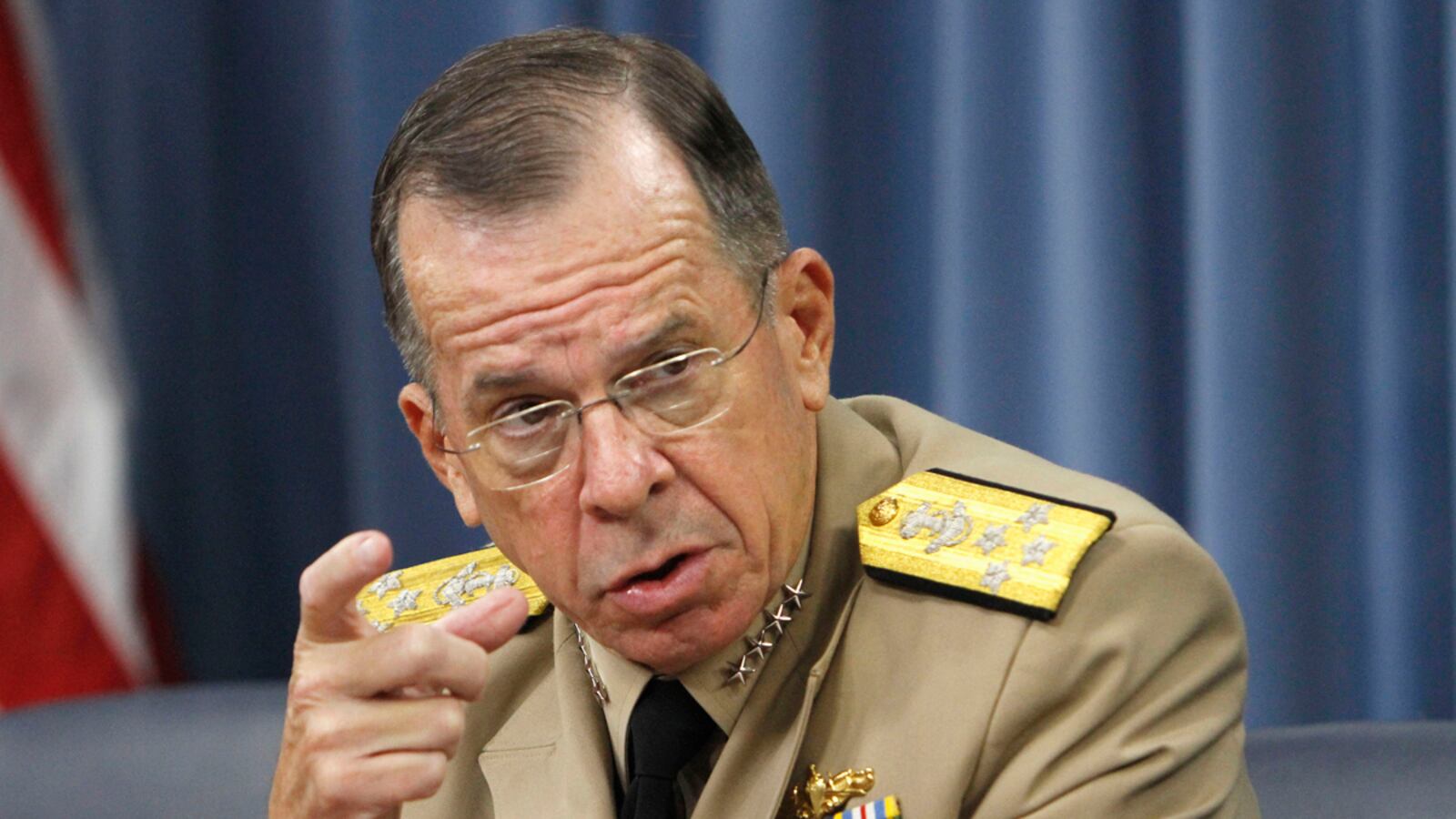The Obama administration backed away this week from comments that its retiring top military commander made about Pakistan’s ties to terrorism. It turns out, though, that the White House had vetted Adm. Mike Mullen’s written testimony in advance and did not object to his stark assessment that the increasingly active Haqqani terror network was essentially an arm of Islamabad’s spy agency, U.S. officials tell The Daily Beast.
According to three U.S. officials familiar with the process, the National Security Council (NSC) was not only aware of Mullen’s now famous line of testimony about the connections between Haqqani and Pakistan, it did not object to it.
In the testimony as he delivered it to the Senate Armed Services Committee last week, Mullen called Haqqani a “veritable arm” of Pakistan’s Inter-Services Intelligence (ISI) agency. In the prior written testimony vetted by the NSC, Mullen had a near identical phrase that Haqqani was “in many ways a strategic arm” of ISI. Mullen’s blunt words created a new rift in the always tenuous U.S.-Pakistani relationship. For instance, the head of Pakistan’s military, Ashfaq Pervez Kayani, called the accusations “very unfortunate and not based on facts.”
By Wednesday, both the White House and State Department were distancing themselves from Mullen’s remarks. “It’s not language I would use,” White House press secretary Jay Carney said when asked about Mullen’s comment. Carney did however emphasize that Pakistan needed to do more to address the “links” between the Haqqani network and Pakistan’s security services.
Other U.S. intelligence officials objected to remarks Mullen made in oral answers to questions when he said the ISI helped plan a Sept. 13 attack by Haqqani on the U.S. embassy in Kabul.
One U.S. official told The Daily Beast, “U.S. intelligence does not support the assertion that the ISI had foreknowledge or directed the Sept. 13 attack.”

Mullen’s office Wednesday affirmed that the admiral, who is set to step down Friday as chairman of the Joint Chiefs of Staff, stood by his testimony to Congress last week.
When Mullen submitted his written testimony to the NSC for a routine review, White House aides urged Mullen to change a section of his testimony where he said the Pakistani government’s support for the Haqqani Network and the Quetta Shura, the leadership council of the Pakistani Taliban, “may violate international norms, potentially warranting sanction.” But it made no comments about his assessment that Haqqani was essentially operating as an arm of ISI, officials confirmed to The Daily Beast.
Mullen’s remarks were significant because in the past U.S. officials have only acknowledged that elements of Pakistan’s ISI and military were supporting al Qaeda and the Taliban. Mullen’s testimony went further by saying the Haqqani network, which is a part of the Afghan Taliban and enjoys safe haven on the Pakistan side of the border with Afghanistan, was supported by the ISI as a matter of state policy.
The Mullen testimony also reflects how the White House has had to balance its anger at the Pakistani security services with its need to work closely with elements of the Pakistan military, counterterrorism and intelligence arms. This year has been the most successful for the U.S. war against al Qaeda and at the same time the worst year since 2001 for the U.S.-Pakistan relationship.
The ISI was so displeased, for example, with the U.S. raid to kill Osama bin Laden in Abbottabad, that the directorate leaked the name of the agency’s station chief in Islamabad to the Pakistani press, forcing the U.S. spy chief to be recalled. Before the bin Laden raid, a U.S. security contractor named Ray Davis was held for nearly three months in a detention facility after he allegedly killed two men in January.
A U.S. counterterrorism official said, “The U.S.-Pakistani relationship ebbs and flows, and there are of course areas of agreement and disagreement. We’re candid about that. It’s a complicated partnership. When our interests intersect, we have a responsibility to work together against the terrorists that threaten both our countries.”
Dan Markey, a senior fellow and Pakistan expert at the Council on Foreign Relations, said, “The White House has been walking a fine line for a long time” in the relationship.
“It looked initially like they had decided to push the line with the Mullen testimony. His statements were more direct about these linkages between the ISI and Haqqani than anything we have heard before,” Markey said. “The implication of that was that the United States was making an implicit ultimatum that either Pakistan take action or we would.”






